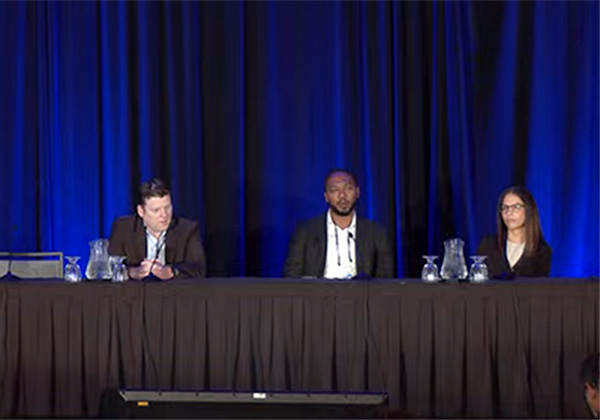
Automation, Data Dominate Conversation on Servicing Tech at MISMO Summit

(From left: Brandon Latman, Jason Braxton and Kiran Sahota, via livestream)
Automation, good data and the evolution of technology were all hot topics discussed by a panel titled “Executive Perspectives on the Future of Servicing” at the MISMO Spring Summit June 4 in San Francisco.
Moderator Matt Tully, Senior Vice President and Chief Compliance Officer at Sagent, King of Prussia, Pa., kicked off the panel by inquiring how the state of servicing looks just over four years after the onset of the COVID-19 pandemic.
“I think the mortgage servicing industry has done a fantastic job with the pandemic,” said Brandon Latman, Senior Vice President and Head of Default for Mr. Cooper, Lewisville, Texas.
Latman said one major takeaway from the pandemic is that more digitization in servicing is possible, and the resources exist to do it. “I think we just have to now take the next steps to making that part of our daily lives,” he said.
Jason Braxton, Senior Vice President of Customer Service at NewRez, Fort Washington, Pa., pointed to lessons learned and improvements made in scalability and flexibility. “It pushed us in a way that made us grow probably faster than we thought we could. But it also taught us we could do it,” he said.
Kiran Sahota, Executive Vice President for Technology at Freedom Mortgage, Boca Raton, Fla., said the pandemic also provided opportunities to reevaluate and really think about the servicing technology in use, as well as focusing on data strategy.
Shifting from the past to the future, Tully asked the panelists what they think is going to change the most in servicing over the next few years.
Latman pointed to automation, and the various factors that accompany it. “All these things are going to be driven by data. How we come up with data, how we have good data, how we have good data facilities, [….] how we start to use the cloud and migrate,” he listed.
“I think automation is where we’re headed, for sure. And, I think staying focused on the customer journey,” Braxton said. “We want to ensure that we’re meeting them where they are.”
Sahota agreed, and noted: “I think the core thing is you [have] to focus on data first. This is absolutely a data-first strategy, because automation doesn’t happen without understanding your data.”
She also cautioned that conversations about automation and technology go hand-in-hand with information security and data privacy; servicers need to be thoughtful about what processes they are automating and what data they are using. And, she noted the importance of data hygiene and standardization as related topics.
There are other important priorities to keep in mind moving forward with servicing technology.
For example, Braxton talked about the need for servicers to consider financial literacy with their homeowners, and building good relationships even as automation is introduced to ease certain processes.
“We want to make it easy with automation,” he said. “You want to get them signed up with [automated clearninghouse services] and all these things that make it easy as a servicer, or make it easy for the homeowner to self-serve. But you also want to be there to counsel and speak with them, give them advice, and explain things like that.”
